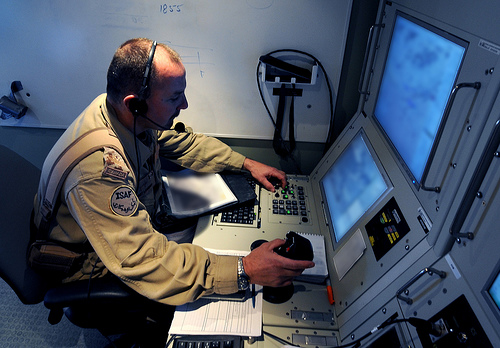 Last week, the Obama administration announced its intention to increase the use of unmanned aerial vehicles (UAVs), or drones, to fight the Taliban and Al Qaeda in Pakistan. I posted a query here, wondering what you think about the use of drones and asking your opinion on whether or not you'd like to see the story of remote-controlled aircraft covered by Digital Nation.
Last week, the Obama administration announced its intention to increase the use of unmanned aerial vehicles (UAVs), or drones, to fight the Taliban and Al Qaeda in Pakistan. I posted a query here, wondering what you think about the use of drones and asking your opinion on whether or not you'd like to see the story of remote-controlled aircraft covered by Digital Nation.
We received a bunch of responses -- so far, most everyone seems to think it's a worthwhile topic to pursue in some way. One response, from an aerospace engineer in Indiana, questioned the criticism of drones and encouraged us to look at remote-controlled war with some historical perspective. Here's an excerpt:
I have never once heard the use of cruise missiles attacked as fundamentally wrong compared to other means of killing, and yet when the aircraft attacking the target is controlled from the ground everyone cries out 'this dehumanizes war and must be stopped!'. Must we be reminded that the UCAVs are crewed by men who, regardless of the remote nature of their targets, still have to watch them die over the FLIR?
In 1139, the Second Lateran council outlawed crossbows because they enabled untrained soldiers to kill armored men, nobles, at great ranges and little risk. Almost every weapon developed since then has increased the distance, and therefore this perceived psychological gap, between the user and his target. From rifled muskets to cruise missiles, the range has increased to the point where a crew of two can hit the Khyber pass from Creech AFB in Nevada.
Crewmen at Creech are lucky in that they get to go home to their families when off-duty, but do we really want to begrudge them that? How does making war more painful on the individual participants decrease the likelihood that our leadership will be forced to or elect to use the military for its intended purpose? Is the link between a soldier's suffering and the grand strategy of national leadership so close? Has it ever been? As Thucydides said, "The strong do what they can and the weak suffer what they must". Would we gain a stronger national conscience if our Soldiers and Marines went into battle without air support, armored vehicles or helmets? War would continue apace, only more Western soldiers would die.
If closing the distance between killer and victim makes war more appropriately real to us, then perhaps we should return to bashing one another over the head with maces. Either way, our foes will be dead, and we will be left to cope with the consequences.
This perspective takes a long view of history: technology has always pushed us farther away from the physical experience of war, and how is this new variation any different? There are sophisticated arguments on both sides of the question. If anything, the engineer's thoughts remind me that this is one of the most profound examples of the need for reflection that comes with the power of the technology at our fingertips. We hope to dig deeper here in the upcoming weeks.
Whatever the larger moral conversation, the fact is that the use of drones to identify and take out targets is a centerpiece of our approach to the crisis in Pakistan right now. Pakistan and the U.S. are reportedly at odds about the policy, and the Taliban retaliated last week. For now, the situation looks dangerously grim.
The drone strikes at the center of the debate are taking place in Pakistan's frontier provinces, neighboring Afghanistan in the north and west. In one border region, the Taliban is demanding recognition of a recent agreement with the national government to instate sharia law. Tomorrow night, FRONTLINE/World takes a harrowing look at life under growing Taliban influence through the eyes of Pakistani children. After "Children of the Taliban," our Digital Nation segment on South Korea, "The Most Wired Place On Earth," will air: two versions of adolescence in two parts of the world wrestling with extremely different challenges. We hope you can watch.
-- Caitlin
Photo credit: CC Lafrancevi/Flickr
Comments